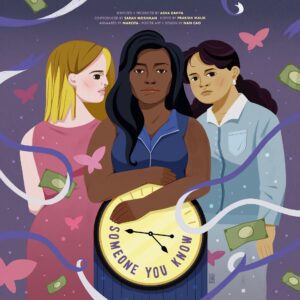 Guest post by Asha Dahya
Guest post by Asha Dahya
Where were you on June 24, 2022? Do you remember how you felt when you heard the news that Roe v Wade had been overturned by the US Supreme Court? What kind of emotions did you feel when you realized we had taken 50 steps backward on bodily autonomy and reproductive rights?
I was shocked, but not surprised. Angry, but also determined.
You see, I am a former conservative Christian who identified as “pro life” or anti-abortion, who had never personally done any research, or even cared about the issue of abortion at all. I just knew to repeat what I had been taught in my church environment, without giving a second thought to the actual ramifications of wanting to overturn Roe v Wade. It has long been the goal of the conservative Christian movement to overturn Roe. So it was not a huge surprise when it happened, because that is exactly why my former church friends voted for Donald Trump. He made no secret of wooing the Evangelical vote, dangling the promised carrot that he would elect “Pro Life Supreme Court Justices who would overturn Roe v Wade.” In 2022, their decades-long mission was accomplished.
But what DID they actually accomplish? Now that I am years removed from that conservative environment, a mom of two young kids, and having dedicated my filmmaking and advocacy work to reproductive rights, I can see very clearly that the only thing we are going to see is more injustice.
Having been on both “sides” of the proverbial fence, I firmly believe that the labels pro choice and pro life are not adequate. Pro life feels hypocritical at best, and pro choice does not go far enough. It’s hard to have the privilege of choice when so much injustice blocks our autonomy.
We’re all familiar with the term reproductive rights, which is a specific movement pointing to the legal and political gains with regard to abortion and birth control. And to be clear, the gains we have seen and continue to see are important and must continue. (Remember the five states that overwhelmingly voted to protect abortion rights in the recent mid-terms in various ballot measures?) But now that Roe v Wade is gone, we have to reach for much bigger goals.
That brings me to Reproductive Justice, a goal and a movement, which, as Monica Simpson, the executive director of SisterSong Women of Color Reproductive Justice Collective, described in the New York Times in April, should be the “mountaintop.” SisterSong defines Reproductive Justice as the human right to maintain personal bodily autonomy, have children, not have children, and parent the children we have in safe and sustainable communities.
 The Reproductive Justice movement may not be as familiar to some as the term Reproductive Rights. But it defines the larger issue, which as we are seeing more and more in a post-Roe America, is much greater than access to abortion and birth control, as important and vital as those things are.
The Reproductive Justice movement may not be as familiar to some as the term Reproductive Rights. But it defines the larger issue, which as we are seeing more and more in a post-Roe America, is much greater than access to abortion and birth control, as important and vital as those things are.
In 1994, a group of Black women leaders gathered together for a conference to discuss the fact that reproductive freedom cannot be reduced to one single issue. “People of color don’t have the privilege of focusing on only one issue — everything is connected. Reproductive Justice has always been more than just being ‘pro-choice.’ To be pro-choice you must have the privilege of having choices,” writes Monica Simpson in the New York Times.
One of the original leaders and founding mothers of the Reproductive Justice movement, Loretta Ross explained, “Reproductive Justice addresses the social reality of inequality, specifically, the inequality of opportunities that we have to control our reproductive destiny.”
Reproductive Justice Briefing Book: A Primer on Reproductive Justice and Social Change
So what does it look like to live in a country where justice is not yet attainable for many on their reproductive journey? Here are some of the intersecting issues and stories that I hope will illustrate what it means to pursue a justice-driven agenda.
Reproductive Justice means access to clean drinking water. Right now, residents in Jackson, Mississippi, do not have access to a regular supply of clean drinking tap water. This is a growing crisis in some of America’s most underserved cities. For mothers and children not to have access to clean drinking water in some cities in the United States in 2022 simply because of their zip code is an injustice that impacts every aspect of their health and lives. Clean water is an essential human right according to the UN, and with a number of predominantly Indigenous, low income, Black and Brown communities across the US seeing their access to clean water disappearing because of the lack of funding for adequate infrastructure, we should be paying more attention to this issue that comes with myriad diseases that affects a child’s development. Simply put, this should be a bipartisan issue that underscores the “pro life” moniker, yet this is not an issue that movement even advocates for.
Reproductive Justice means tackling the maternal mortality crisis. America is the only industrialized nation in the world where our maternal mortality rates are rising, and data shows 50% of these deaths are preventable. It should come as no surprise that the majority of these deaths are Black women. Right now there is a proposed bill called the Kira Johnson Act, sponsored by Georgia Senator Raphael Warnock and California Senator Alex Padilla. This bill would provide crucial funding and bias training to ensure these deaths stop happening. Kira Johnson, a 39-year-old Black mother, for whom the legislation is named, lost her life after a scheduled c-section while giving birth to her second child in Los Angeles.
Reproductive Justice is a criminal justice issue. Today in America (a country that already boasts the highest prison population on the planet), the rates of women being imprisoned are rising faster than men. According to recent data, 58% of women in prisons are mothers, as are 80% of women in jails. Many are incarcerated simply because they cannot afford bail. The majority of these mothers are the primary caretakers of their children which they then become separated from. Most of these women are incarcerated for drug and property offenses, often stemming from poverty and/or substance use disorders. We need to see this entire for-profit system overhauled so that mothers get the help they need to raise their children in safety, rather than being locked away for systemic issues that victimize them.
 Reproductive Justice means stopping the decline in maternal health clinics and doctors, which has been happening rapidly with the fall of Roe v Wade. According to a recent report by the March of Dimes, nearly half of the counties in Texas are maternity care deserts with no birth center, no obstetricians and no hospital offering obstetric care. Doctors in states like Texas which have become hostile to abortion rights, are leaving for other states in order to prevent the potential loss of license or being prosecuted for helping mothers in need – even in the case of a miscarriage or an ectopic pregnancy when an abortion procedure becomes a lifesaving measure.
Reproductive Justice means stopping the decline in maternal health clinics and doctors, which has been happening rapidly with the fall of Roe v Wade. According to a recent report by the March of Dimes, nearly half of the counties in Texas are maternity care deserts with no birth center, no obstetricians and no hospital offering obstetric care. Doctors in states like Texas which have become hostile to abortion rights, are leaving for other states in order to prevent the potential loss of license or being prosecuted for helping mothers in need – even in the case of a miscarriage or an ectopic pregnancy when an abortion procedure becomes a lifesaving measure.
Reproductive justice means having a national paid family leave policy, which the US Senate could have (and yes, should have) passed in the Build Back Better Act earlier this year. However, because of partisan politics, we remain the only industrialized nation in the world not to have a federal paid leave policy, which disproportionately impacts mothers who are still the primary caretakers of children across America. Why does this matter? Because one in four American moms return to work within two weeks of giving birth, breaking that crucial time of bonding between mother and child that carries so much weight in the development of a newborn. Studies show that for every extra week of guaranteed maternity leave for birth mothers, this correlates with a two to three percent decline in infant deaths. That last sentence alone should make this a banner issue for the pro life movement, but alas it is not.
And yes, Reproductive Justice means access to abortion and birth control. I am in post production on a short documentary called Someone You Know – 3 women, 3 decisions, 1 hostile landscape, which profiles the stories of three women who had later abortions, documenting the numerous barriers they faced. Each of them shared their experiences with candor, showing how even in the most heartbreaking situations past the first trimester, when a wanted pregnancy goes wrong, the climate of abortion restrictions and stigma end up hurting the most vulnerable among us, and in some cases takes pregnant women to the precipice of death before medical intervention becomes a possibility. When women and girls have the freedom, dignity and ability to plan their lives, families and pregnancies, we see healthier babies, supported mothers, and a life cycle that reminds us of the need for bodily autonomy beyond a political talking point.
Recalling my former conservative Christian days, when I look at this brief list of Reproductive Justice issues I see something that is far more “pro life” than any anti-abortion agenda. As a mother who had the privilege of having good healthcare access, ample time to bond with both of my babies after giving birth, a supportive partner, clean drinking water as well as healthy food available to me, how can I not want the same for everyone else? How can anyone in their deepest, most heartfelt state look at these issues and see it as a partisan list, as opposed to inherent human rights?
As we head into the holiday season, a time when many stories of need are amplified, when generosity is the highest, and families are able to benefit from programs that take advantage of the holiday “spirit,” I hope the information in this article stays with you well into the new year. I am still on a journey myself, and I want to continually advocate for Reproductive Justice throughout all the work I do.
—–
Asha Dahya is an author, TEDx speaker and founder of GirlTalkHQ.com Asha was born in the UK, raised in Australia, and now resides in Los Angeles, California. She has spent the last 16 years creating, producing and hosting content for networks such as MTV, MSN.com, Disney, ABC, Nickelodeon, Fox, Nine Network Australia and more. Considered a voice of authority in the feminist media space, she has delivered keynote addresses for organizations such as Accenture, UCLA and March for Moms. Asha has also moderated panels for UN Women, Mount Saint Mary’s University, EmpowHer Institute, Women’s Voices Now Film Festival, rePRO Film Fest, and Continuum Collective. Asha is a recipient of the Awesome Without Borders grant from the Harnisch Foundation, and the 2022 Creative Power Award grant. Through her work, Asha focuses on reproductive rights, gender equality, and the representation of women in media. She is passionate about empowering women, girls and femmes to take up space, raise their voice and share their story with the world.
